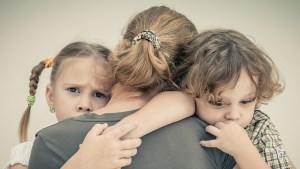“The heart is not beating. It seems the fetus is dead,” announced the doctor. Having arrived alone for her ultrasound, Vanessa was in a state of shock. “It was a very easy pregnancy,” she recalls. “When I came in for an ultrasound a month before everything was normal.” The doctor proposed that her baby be removed surgically. But when she woke up after the operation, she couldn’t stop crying. “I cried for a whole week. Luckily my husband was there to talk to me. He was also very sad. It took me months to be able to talk about this without crying.”
Miscarriages are common, but this is of little comfort to those who have suffered one.Women who have faced this ordeal are often surprised by the intensity of their emotions, accompanied by tears, insomnia, extreme exhaustion, and even depression.
Experiencing deep suffering
Fear of never being able to have children is also common, especially among those who’ve had multiple miscarriages. But according to a French gynecologist, Florence Allard, “As long as you can get pregnant there is no cause for despair. All you need are some medical tests to explain your miscarriages, treatment, and some psychological assistance.” The depressive state can be partially explained by a hormonal shift as the body readjusts to not being pregnant. But this contributes to a woman’s vulnerability. Miscarriage is like a birth without a child, making it hard to accept all the suffering.
A beautiful dream has been broken with miscarriage. During the time of pregnancy, many women grow attached to their developing child, so there can be a feeling of guilt.“Practically all women blame themselves,” notes Florence Allard. There is always something to feel guilty about, even though these feelings are seldom connected to reality: accepting an extra workload, traveling, leading a busy life, or not being worthy of a child.
Expressing the grief
It takes time to heal. While a woman can become pregnant again after one menstrual cycle, it is best to wait three to four months to be both physically and psychologically ready. Otherwise there’s risk of transferring one’s thwarted expectations to a new child. Many women are often reluctant to become pregnant again, having experienced their own helplessness in the face of life and death.
“First we need to help women to express their pain,” says Florence Allard, “If they don’t take time to grieve, if they bottle up their emotions, they will never work through them.” Unfortunately, some family and friends persist in telling women they should not take their loss too hard. But even if the head says that what has happened is not dramatic, the body and the heart tell otherwise.This is why women need to express their grief and be heard.
Relying on faith to move on
Spiritual help can also play a huge role.Vanessa, who was worried about the child she lost, received a consolation from her priest “Now he is watching over your family. You can ask him to protect his brothers and sisters. And he will be the first to greet you in Paradise.” Many families also mention their lost little ones in their prayers, or ask for their prayers.
In order not to be consumed by this death, it is vital to entrust the child to God. Accepting this tragic death is to say “yes” to life and keep moving forward. It’s the grace of surrender.
Gradually, some women discover that this ordeal has opened their hearts, made them feel closer to those who have suffered. “Life is fragile, it’s a gift, not to be wasted. This death has opened me up to the essentials,” says Vanessa.
Florence Brière-Loth

Read more:
How to help your children cope with your miscarriage

Read more:
How to cope with the fear of losing another baby after miscarriage

